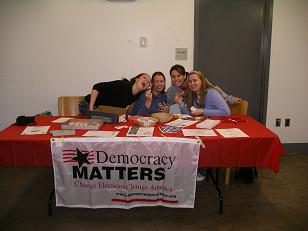Democracy Matters is an organization that allows progressive minds, at perhaps their greatest effectiveness, to successfully focus their talents and skills for a positive change that will significantly influence the world in which we all live. Working inside this group lets individuals have a strong voice in our society because you gain the ability to educate yourself on the importance of “Clean Elections,” educate others on its importance, and become part of the larger portrait that is demanding voter owned elections in our country.
The number one key to becoming an effective campus coordinator for Democracy Matters is education. The first step is trying to fully understand the importance of taking special interests out of our politician’s pockets. You don’t have to know all the details of our political process, but it helps to do some research on how campaign donations from corporations have swayed our representatives’ votes for far too long. The “special interests” that campaign contributions have led to means an increase in social and economic inequalities and a decline in our society’s safety net for the majority of the population. Almost any way you look at it, publicly financing campaigns would decrease political corruption, allow for more progressive legislation to pass, and increase democratic decision making processes in our country.
With a little education under my belt, I have been able to go out into my community and educate others on the importance of clean elections. This is not an easy task, but like they say, there’s many ways to skin a cat. Some of the tactics that I used this past year were holding weekly meetings on campus and drawing other students into my Democracy Matters group, then holding events with my group like “Call in Days” where we encouraged various people on campus to call our Reps to support the “clean election” cause. Plus, we also did “class-raps” because they’re a great way to educate a big group a people at one time about the importance of this movement.
Lastly, but just as importantly as educating yourself and others, is to form coalitions with various local organizations, and those dedicated to working on this project are especially helpful. I personally worked hand in hand with Voter Owned Hawaii (VOE) and they were wonderful, but one could go to almost any NGO in their community for assistance. Kory from VOE helped me with physical, mental, and emotional support for my events that I desperately needed at times. I can almost guarantee that anyone else working events will feel the same way; the more help, the better. Or to quote an old striker’s song, “The more we get together the happier we’ll be”.
This is the trinity of knowledge that I have gained from working this past semester with Democracy Matters, I hope it helps because the sooner we get this progressive legislation passed the sooner we can get on with saving our world.
Jenny Knippling
Democracy Matters Campus Coordinator,





